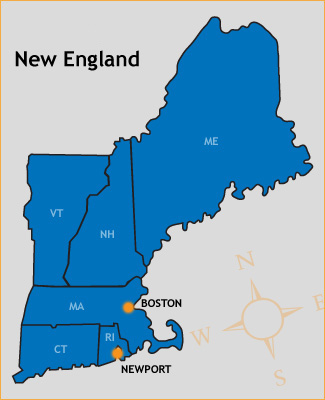Some Facts About Newport, RI
- Newport is home to one of the largest collections of colonial homes in the country. Many of these homes have been converted to Bed & Breakfasts, allowing visitors to stay and experience Newport's storied past.
- In addition to its famous mansions, Newport offers visitors beautiful waterfront resorts, the finest shopping and an amazing selection of restaurants serving everything from diner classics to steak houses and seafood.

- Newport is home to one of only a few yacht restoration schools in the world. They invite visitors to stop in and see their latest restoration endeavor.
- There are a great number of events going on all year in Newport including
the famous Newport Folk Festival, Jazz Festival and all the Wharf festivals throughout the year.
- Summer is not the only time to visit Newport. There are activities and
events happening year-round including one of the oldest and best St. Patrick's Day
celebrations around!
A Listing of Newport, RI EventsNewport, RI History
- Newport, RI was founded in 1639 by English settlers looking for
religious freedom.
- By the mid 18th century Newport, RI was one of the most important
ports in colonial America, rivaling New York and Boston. Before the
Revolutionary War, Newport, RI boasted the fifth largest population in
the American colonies. Some of the finest craftsmen in colonial America
were from Newport, RI.
- In 1763 construction on the Touro Synagogue was finished, making
Newport, RI home to the oldest synagogue in North America.
- During the Revolutionary War Newport, RI was a hotbed of discontent.
British troops occupied Newport, RI from 1776 to 1779. Upon their retreat
British forces set fire to Newport, destroying many of Newport's original
homes.
- After the Revolutionary War Newport, RI was no longer a major seaport.
By the 1830's Newport had established itself as a summer colony. Some of
Newport, RI's most prominent early summer colonists included Julia Ward
Howe (author of the "Battle Hymn of the Republic"), author
Henry Wadsworth Longfellow and novelist and playwright Henry James.
- During the Civil War, fearing attack from Confederate sympathizers,
the U.S Naval Academy was moved from Annapolis, Maryland to Newport, RI.
The Naval Academy would remain in Newport, RI until the end of the War in
1865.
- After the Civil War great fortunes were being amassed by the new
industrial barons of the Gilded Age. Their mark on Newport, RI can still
be seen to this day. The famous mansions that line Bellevue Avenue, Ochre
Point and Ocean Drive in Newport, RI were built on a scale never before
seen in the United States.
- With the growing number of prominent New Yorkers making Newport, RI
their summer residence, Newport became a mecca for leisure activities.
Newport, RI was home to the U.S. Open Tennis Championships from 1881 to
1915. The first U.S. Open Golf Championships was held at Newport Country
Club in 1885 and Newport, RI was home to the America's Cup sailing races
until 1983. Because of Newport, RI's long association with the America's
Cup, she has come to be known as the "Sailing Capital of the World".
- In the mid-20th century a massive restoration movement occurred in
Newport, RI. Spearheaded by tobacco heiress Doris Duke, many colonial era
Newport homes were quite literally saved from the wrecking ball. At a time
in this country when countless historical dwellings were lost forever, Ms.
Duke is credited with saving and restoring almost 100 buildings in
Newport, RI. To this day, Newport, RI boasts the largest concentration of
original colonial-era buildings in the United States.

